

Royal prank radio station to pay $525,000 to family of dead nurse. Dan Kitwood / Getty Images Ben Barboza, the husband of Jacintha Saldanha, a former nurse at King Edward VII hospital who was involved in a hoax call concerning the Duchess of Cambridge, arrives with family members at the Houses of Parliament on Monday. By Ian Johnston, NBC News LONDON — A radio station is to pay at least $525,000 to a memorial fund in the name of a nurse found dead after two DJs duped her into putting their call through to the hospital ward where Duchess Kate was being treated for an extreme form of morning sickness.
Jacintha Saldanha was found dead in London on Friday after the prank in which Australian radio hosts Mel Greig and Michael Christian pretended to be Queen Elizabeth and Prince Charles in the call to London’s King Edward VII’s Hospital. Greig and Christian spoke Monday about their distress over Saldanha’s death, saying it had left them "shattered, gutted, heartbroken. " DJs speak out, say they're 'heartbroken' over death of nurse in royal hoax call. Political action committee. In the United States, a political action committee (PAC) is a type of organization that pools campaign contributions from members and donates those funds to campaign for or against candidates, ballot initiatives, or legislation.[1][2] At the federal level, an organization becomes a PAC when it receives or spends more than $1,000 for the purpose of influencing a federal election, according to the Federal Election Campaign Act.[3] At the state level, an organization becomes a PAC according to the state's election laws.
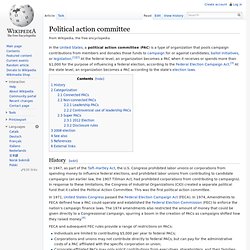
History[edit] In 1947, as part of the Taft–Hartley Act, the U.S. Congress prohibited labor unions or corporations from spending money to influence federal elections, and prohibited labor unions from contributing to candidate campaigns (an earlier law, the 1907 Tillman Act, had prohibited corporations from contributing to campaigns). In 1971, United States Congress passed the Federal Election Campaign Act (FECA). In its 2010 case Citizens United v. Categorization[edit] How Much Much Are Super PACs Spending? - The Wall Street Journal. Chapter7. Super-PACs already planning for 2014 - The Hill. Election Day has come and gone, but the super-PAC era is just beginning.
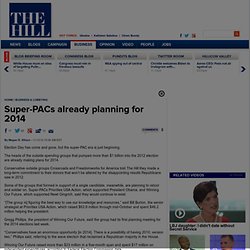
The heads of the outside spending groups that pumped more than $1 billion into the 2012 election are already making plans for 2014. Conservative outside groups Crossroads and Freedomworks for America told The Hill they made a long-term commitment to their donors that won’t be altered by the disappointing results Republicans saw in 2012. Some of the groups that formed in support of a single candidate, meanwhile, are planning to retool and soldier on.
Super-PACs Priorities USA Action, which supported President Obama, and Winning Our Future, which supported Newt Gingrich, said they would continue to exist. What is a PAC? Political Action Committee (PAC) — A popular term for a political committee organized for the purpose of raising and spending money to elect and defeat candidates.
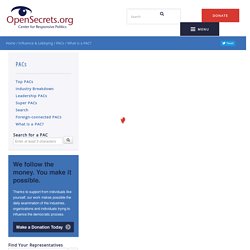
Comment: Super PACs: Worse to Come. You’re nothing in Presidential politics this year without a Super PAC.
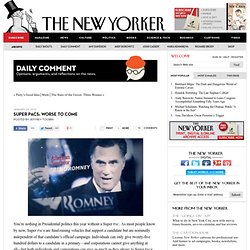
As most people know by now, Super PACs are fund-raising vehicles that support a candidate but are nominally independent of that candidate’s official campaign. Individuals can only give twenty-five hundred dollars to a candidate in a primary—and corporations cannot give anything at all—but both individuals and corporations can give as much as they please to Super PACs. Thanks to absence of those limits, in the South Carolina Republican primary, Super PACs spent about twice as much as the candidates themselves. So far, it seems, the influence of Super PACs has been immense. Super PACs seem to deserve much of the credit for the fall and rise of Newt Gingrich’s Presidential campaign.
This strange legal superstructure for our campaigns has come about largely because of Supreme Court decisions, especially the Citizens United case, from 2010. Through most of American history, there were no limits on campaign contributions. Types of Primaries" A primary closely resembles a general election -- when voters choose between candidates from each party for office.
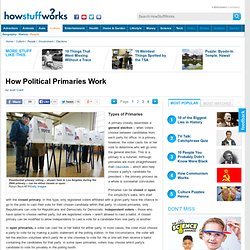
In a primary, however, the voter casts his or her vote to determine who will go onto the general election. This is a primary in a nutshell. Although primaries are more straightforward than caucuses -- which also help choose a party's candidate for president -- the primary process as a whole is somewhat convoluted. Primaries can be closed or open. Chapter 7 Study Guide flashcards. The Electoral College - Pros and Cons. By William C.
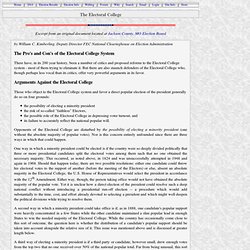
Kimberling, Deputy Director FEC National Clearinghouse on Election Administration. Chapter 7 Study Guide flashcards. SuperPAC - What Does It Mean? By Dave Manuel What is a "superPAC"?
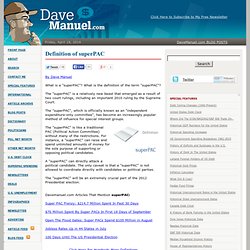
What is the definition of the term "superPAC"? The "superPAC" is a relatively new beast that emerged as a result of two court rulings, including an important 2010 ruling by the Supreme Court. The "superPAC", which is officially known as an "independent expenditure-only committee", has become an increasingly popular method of influence for special interest groups. What's the difference between soft and hard money campaign contributions?" In the simplest terms, "hard money" is from political donations that are regulated by law through the Federal Election Commission.
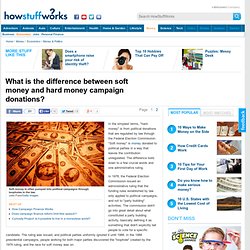
"Soft money" is money donated to political parties in a way that leaves the contribution unregulated. The difference boils down to a few crucial words and one administrative ruling. In 1978, the Federal Election Commission issued an administrative ruling that the funding rules established by law only applied to political campaigns, and not to "party building" activities. The commission didn't go into great detail about what constituted a party building activity, basically defining it as something that didn't explicitly tell people to vote for a specific candidate. The ruling was issued, and political parties uniformly ignored it until 1988. Dandring33.